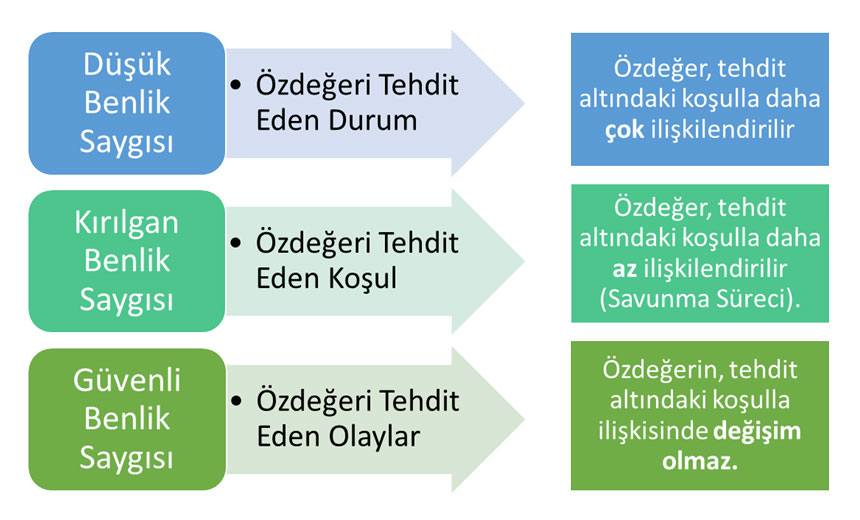The Relationship of Self-Esteem to Conditional Self-Worth

People may encounter some threats to their self-worth e.g. social exclusion, comparison with others, failure, etc.) in their daily lives. In such cases, a person can use many defense processes to protect himself. For example, in jobs that require success, people may deny responsibility for failure and attribute the reasons to external factors, compare themselves with those below them instead of those above them, or underestimate the importance of success. One factor that affects these defenses a person uses is self-esteem: In general, people with high self-esteem are more likely to use the defense processes we mentioned above to protect themselves than people with low self-esteem.
Decreasing Self-Worth: A Method of Defending the Self
Buckingham, Weber, and Sypher (2012) demonstrated a defensive process used by people with high self-esteem. According to the study, after threats to certain areas of the self, people with high self-esteem reported that their self-esteem was not as tied to the threatened area as their previous evaluations were. It was observed that people with low self-esteem increased the degree to which their self-esteem depended on the threatened area compared to their previous evaluations. For example, people with high self-esteem tended to reduce the relevance of this domain to their values after academic failure, while people with low self-esteem tended to increase the connection of their values to academic success.
Linking one’s perception of self-worth to certain situations is defined as “conditional self-worth”. For the psychological problems caused by conditional self-worth, you can read our article called “Conditional Self-Worth” . Having a weaker connection of one’s self-worth to circumstances is typically an adaptive and healthy behavior, as people who attribute their self-worth to fewer conditions tend to experience positive feelings about the self, which is stable even in the face of threats. However, it was revealed by researchers at Towson University that weakening the connection between one’s self-worth and these situations in situations that threaten one’s self-worth is not a personality trait, but is related to defense processes (Buckingham et al., 2019).
High but Fragile Self-Esteem
Continuing Buckingham and his team’s previous work (Buckingham et al., 2019), it is highlighted that a small nuance in self-esteem affects a person’s conditional self-worth. In this study, individuals with high self-esteem also evaluate it on permanence/fragility. Participants are then asked to recall some of the situations that threatened their sense of self. Finally, the Conditional Self-Worth Scale is applied.
At the end of the study, it was determined that participants whose self-esteem was stable and secure (high value reflected externally and felt internally) did not decrease their conditional self-worth in the face of a situation that threatened their self-esteem. On the other hand, it was observed that people with fragile self-esteem (high external self-esteem, low internal self-esteem) weakened the connection between their self-esteem and the situation after a situation that threatened their self-esteem.

Although the conclusion from the previous study was that the reduction in conditional self-esteem after self-threatening situations was seen in people with high self-esteem (Buckingham et al., 2012), in a study conducted a few years later, this was not valid for people with secure and stable self-esteem, but only self-esteem. It has been revealed that it is a part of the defense processes of those who have high respect but are fragile (Buckingham et al., 2019). Examining this relationship between states of self-esteem and conditional self-worth in psychiatric disorders such as anxiety disorders and mood disorders is a separate research topic.
RESOURCES:
- Buckingham, J., Lam, T.A., Andrade, F.C., Boring, B.L., & Emery, D. (2019). reducing contingent self- worth: A defensive response to self- threats. the Journal of social psychology, 159 (3), 284-298.
- Buckingham, J. T., Weber, A. M., & Sypher, AK (2012). Self- esteem and self- perpetuating effects of threat on contingencies of self- worth. Self and Identity, 11 (3), 360-385.












